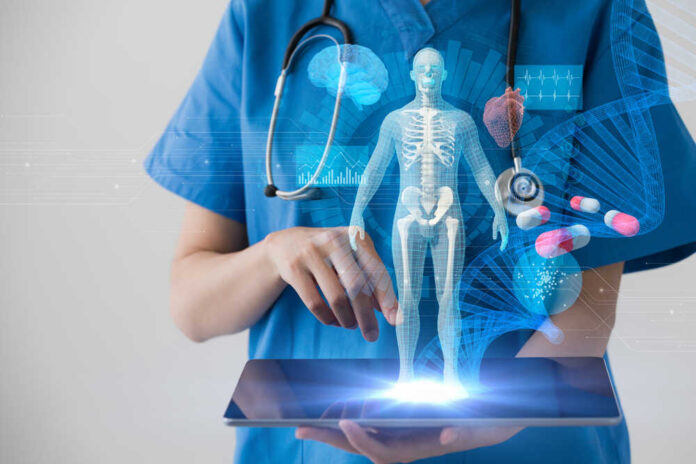
Artificial intelligence (AI) has rapidly evolved from a futuristic concept into an integral part of our daily lives.
It influences the movies we watch, the content we see online, and even the routes we take to work. We find it subtly embedded in our smartphones, our cars, our household appliances—it’s become so pervasive and commonplace that we can’t even keep track of all the things that utilize some form of machine learning algorithm.
But perhaps one of its most profound and potentially disruptive applications lies within the realm of our personal health.
AI in Diagnostic Procedures
AI’s presence in healthcare is already becoming increasingly common in diagnostic procedures, where machine learning algorithms are trained to identify disease patterns.
These AI systems, for example, can analyze radiology images to detect tumors, lesions, or other anomalies that could be indicative of diseases like cancer.
This ability to assist in early detection could lead to improved patient outcomes.
AI in Treatment Plans
Artificial intelligence doesn’t stop at diagnosis. AI systems are also being developed to help create personalized treatment plans.
By analyzing large amounts of data—such as a patient’s genetic information, lifestyle factors, and medical history—these systems can suggest treatment options that are likely to be most effective for the individual patient.
This could lead to more precise and personalized medicine, moving away from the one-size-fits-all approach.
AI in Health Monitoring and Predictive Analysis
Beyond diagnosis and treatment, AI is used in health monitoring devices and predictive analysis.
Wearable technology like fitness trackers and smartwatches use AI to monitor vital signs and track health metrics. Some are even capable of detecting irregular heart rhythms or predicting potential health issues based on the collected data.
And beyond the individual level, AI can also help us model epidemics, disease outbreaks, and other key patterns of community health.
Misuse of AI and Its Threats to Human Health
A new study published in BMJ Global Health urges us to also consider the potential threats of this rapidly evolving technology. The researchers identified three primary ways in which AI may greatly harm human health:
AI for Control and Manipulation
These intelligent data systems can be harnessed to control and manipulate people.
For example, AI-driven social media algorithms can influence our behavior and beliefs,
exploiting our data, behavior patterns, and psychological vulnerabilities. This manipulation can have adverse effects on mental health and contribute to a toxic social environment.
In extreme cases, AI could even be used in cyber-attacks, causing severe physical and psychological harm.
AI in Lethal Autonomous Weapons
Another alarming application of AI is in lethal autonomous weapons. These are weapons that can select and engage targets without human intervention.
The dehumanization of warfare raises numerous ethical and safety concerns. And as the use of AI in warfare spreads to competing nations, this could lead to unexpected and uncontrollable AI arms race escalation, posing a significant threat to global security, stability, and well-being.
AI and the Future of Work
AI is also transforming the world of work. While automation can increase efficiency and productivity, it may render some jobs obsolete, leading to economic insecurity and its associated health impacts.
Job loss can lead to stress, depression, and other mental health issues, as well as physical health problems linked to decreased income and social status.
AI and Data Privacy
Other researchers have also raised concerns about the privacy implications of AI, especially when used in healthcare settings.
Medical data is highly sensitive, and the widespread use of AI in healthcare necessitates the collection and analysis of vast amounts of such data.
This poses questions about who has access to this data, how securely it is stored, and how it is used.
The Algorithm Bias
Another concern that has been raised is the issue of algorithm bias. AI systems learn from the data they are fed, and if this data is biased, the AI could make biased decisions or predictions.
In healthcare, this could lead to certain groups of patients receiving inferior care based on skewed data.
The Need for Effective Regulation and Safe AI Development
To prevent the harmful effects of AI on human health and existence, the authors of the study emphasize the need for effective regulation. This includes the prohibition of certain types and applications of AI and a moratorium on the development of self-improving AGI until adequate safety measures are in place.
They also call for the medical and public health community to engage in evidence-based advocacy for safe AI. This involves taking preventive action in the face of uncertainty and prioritizing public health and safety over technological progress.
While AI’s influence on our health and well-being is undoubtedly complex, it is an issue that demands our attention. As AI continues to evolve and become an even more integral part of our lives, we must strive to understand its implications for our health, both good and bad.
Only then can we ensure that AI is used responsibly, ethically, and to the benefit of all.






















